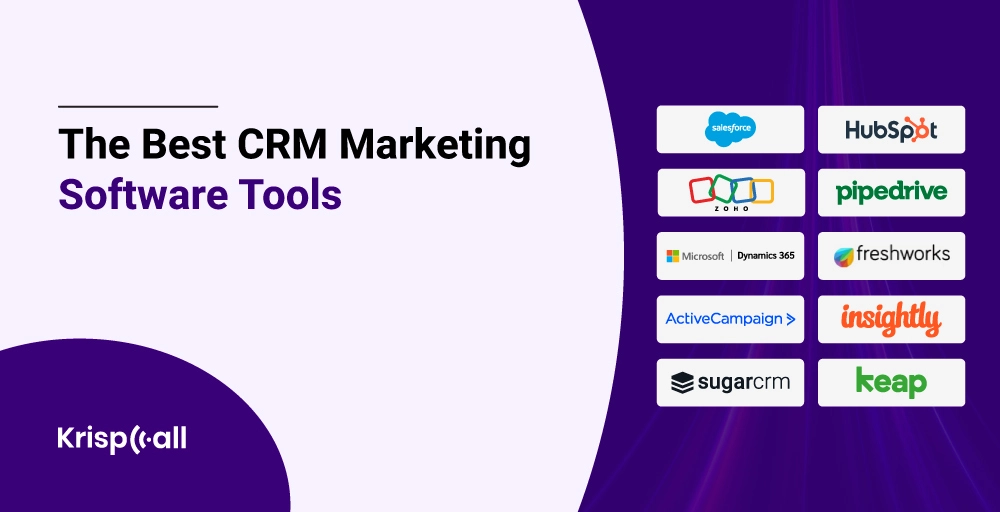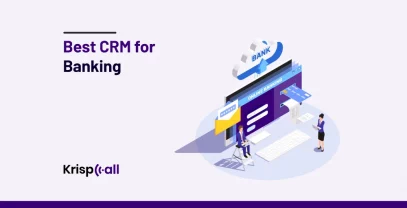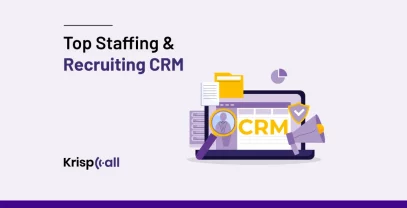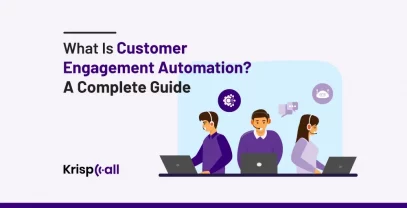Customer Relationship Management (CRM) software, a user-friendly solution, has become the go-to for businesses aiming to elevate their marketing strategies and streamline customer interactions 💼.
With the abundance of CRM marketing tools available in 2024, businesses of all sizes can confidently find the perfect fit that aligns with their unique needs and goals 🎯.
In this article, we will discuss CRM marketing and its benefits and provide you with a list of the top CRM marketing software tools so that you can determine which suits your business’s needs 📊.
🔑 KEY HIGHLIGHTS
- CRM marketing software is a powerful tool that helps businesses manage customer interactions, data, and marketing efforts more effectively.
- CRM marketing software enables personalized customer engagement by providing detailed insights into customer preferences and behaviors.
- To choose the marketing CRM that best suits your business needs, you must consider the CRM system’s features, limitations, and pricing.
- The best CRM marketing tools are Salesforce, HubSpot, Zoho, Pipedrive, and Microsoft Dynamics 365.
What is CRM Marketing?
CRM marketing, or customer relationship management marketing, is a strategy that leverages customer data and interactions to build stronger, more profitable relationships with customers throughout the customer lifecycle. It is also known as a business approach that involves analyzing, controlling, and improving customer relationships using CRM systems—special software developed to automate client communication.
CRM marketing can transform your customer relationships. It is done via software that automatically responds to customer activities and improves customer relationships with brands. CRM kicks in from the first interaction with a potential customer and continues throughout the customer lifecycle. This can significantly enhance your marketing efforts by ensuring timely and relevant customer communication.
Benefits of using CRM marketing software
Customer Relationship Management (CRM) marketing software is a powerful tool that helps businesses manage customer interactions, data, and marketing efforts more effectively.
Here are some of the key benefits of using CRM marketing software:
1. Improved Marketing Efficiency
One of the primary benefits of using CRM marketing software is the significant improvement in marketing efficiency. These tools automate repetitive tasks like sending emails, managing social media posts, and tracking customer interactions.
By automating these processes, your marketing team can focus on more strategic tasks, like crafting creative campaigns and analyzing performance data. The result is a more streamlined and effective marketing workflow, saving time and resources and opening up exciting possibilities for your marketing strategies.
2. Personalized Customer Engagement
CRM marketing software enables personalized customer engagement by providing detailed insights into customer preferences and behaviors. This information allows businesses to tailor their marketing messages and offers to meet each customer’s needs and interests.
Personalized engagement increases customer satisfaction and boosts conversion rates and loyalty. You build stronger, more meaningful relationships by showing customers you understand and value them.
3. Enhanced Customer Insights
Having access to comprehensive customer data is crucial for making informed marketing decisions. CRM marketing software collects and analyzes data from various touchpoints, including email, social media, and direct interactions.
This data is then transformed into actionable insights that help you understand customer trends, preferences, and pain points. With enhanced customer insights, you can identify opportunities for improvement, optimize your marketing strategies, and ultimately drive better business results.
4. Collaboration and Communication
Effective collaboration and communication are vital for any marketing team. CRM marketing software facilitates these by providing a centralized platform where team members can access and share customer data, track progress on marketing campaigns, and communicate in real-time.
This collaborative environment ensures everyone is on the same page, reduces the risk of miscommunication, and improves overall productivity. Enhanced collaboration also leads to more cohesive and coordinated marketing efforts, Essen, which is vital for achieving your business goals.
10 Best Marketing CRM Tools in 2024
| CRM Software | Pricing | Use Cases | Best For |
| Salesforce CRM | Essentials plan starts at $25/user/month | Customizable workflows, sales tracking, customer support | Enterprises, large businesses |
| HubSpot CRM | Free plan; paid plans start at $45/month | Marketing automation, lead management, analytics | Small to large businesses, startups |
| Zoho CRM | Free plan; paid plans start at $14/user/month | Multichannel communication, AI assistance, advanced analytics | Small to medium-sized businesses |
| Pipedrive | Plans start at $12.50/user/month | Visual sales pipeline, task automation | Small to medium-sized businesses, sales teams |
| Microsoft Dynamics 365 | Plans start at $65/user/month | Integration with Microsoft products, AI insights | Large enterprises businesses using the Microsoft ecosystem |
| Freshsales | Free plan; paid plans start at $15/user/month | Built-in phone and email, AI lead scoring, workflow automation | For small to medium-sized businesses, customer service teams |
| ActiveCampaign | Plans start at $9/month | Marketing automation, email marketing, CRM | Small businesses, email marketers |
| Insightly | Free plan; paid plans start at $29/user/month | Project management, workflow automation, email integration | Small businesses, project-focused teams |
| SugarCRM | Plans start at $52/user/month | Highly customizable, sales automation | Large enterprises, businesses needing extensive customization |
| Keap (Infusionsoft) | Plans start at $79/month | Marketing automation, sales pipeline management | Small business startups needing integrated marketing and sales tools |
1. Salesforce
Salesforce is a cloud computing and social enterprise software-as-a-service (SaaS) provider that offers a diverse infrastructure of software products designed to help teams from different industries connect with their customers. Salesforce provides software products for marketing, sales, IT, commerce, and customer service.
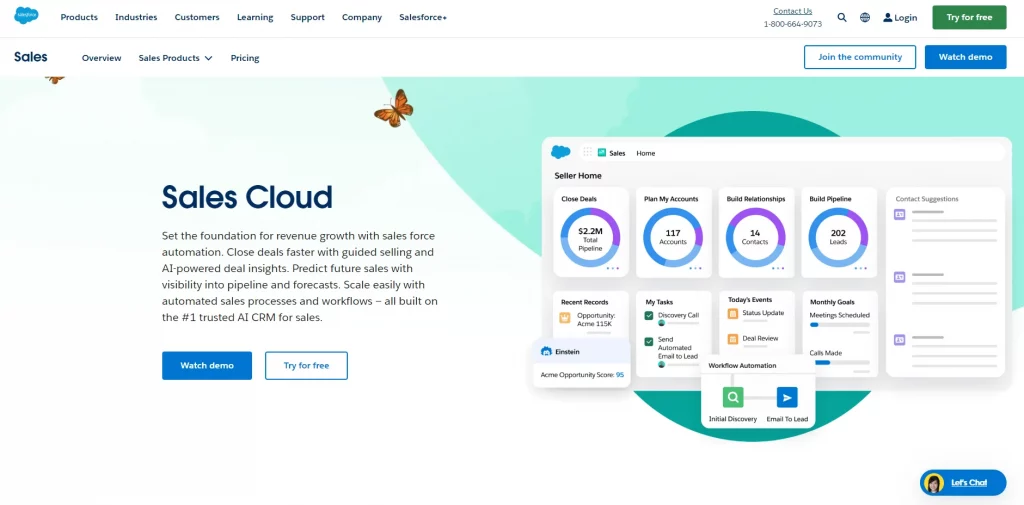
With capabilities like Salesforce Flow Orchestration, you can automate complex, multi-user processes into simple, streamlined workflows. Plus, fully integrated productivity platforms like Slack provide a single place where employees can collaborate right in the flow of work and automate processes.
Features
- Comprehensive sales, service, and marketing automation
- Advanced analytics and reporting
- Customizable dashboards
- AI-powered insights with Salesforce Einstein
- Extensive integration options
Limitations
- High cost, especially for small businesses
- Steep learning curve
- Complex customization requires technical expertise
Pricing
- Essentials: $25/user/month
- Professional: $75/user/month
- Enterprise: $150/user/month
- Unlimited: $300/user/month
2. HubSpot CRM
HubSpot CRM is a robust customer relationship management tool designed to help businesses manage and nurture customer relationships effectively. It offers a centralized platform where users can store contact information, track interactions, manage deals, and automate various aspects of their sales and marketing processes.
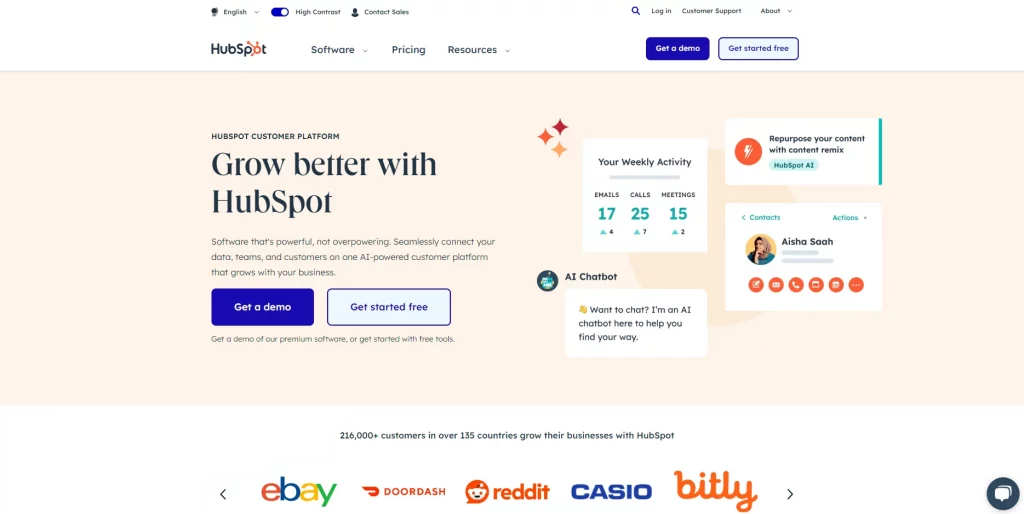
One of HubSpot CRM’s key strengths is its user-friendly interface, which makes it accessible to small and large businesses. It integrates seamlessly with other HubSpot tools like Marketing Hub and Sales Hub, allowing a comprehensive view of customer interactions across different departments.
Features
- Contact management
- Email tracking and notifications
- Pipeline management
- Lead scoring
- Marketing automation
Limitations
- Limited advanced features in the free version
- Higher tiers can become expensive for small businesses
- Some integrations require additional costs
Pricing
- Free plan available
- The paid plan starts at $20/month/seat
3. Zoho CRM
Zoho CRM is a versatile customer relationship management software designed to empower businesses with tools to manage sales, marketing, customer support, and more. It offers a comprehensive suite of features, including lead management, pipeline management, workflow automation, and analytics.
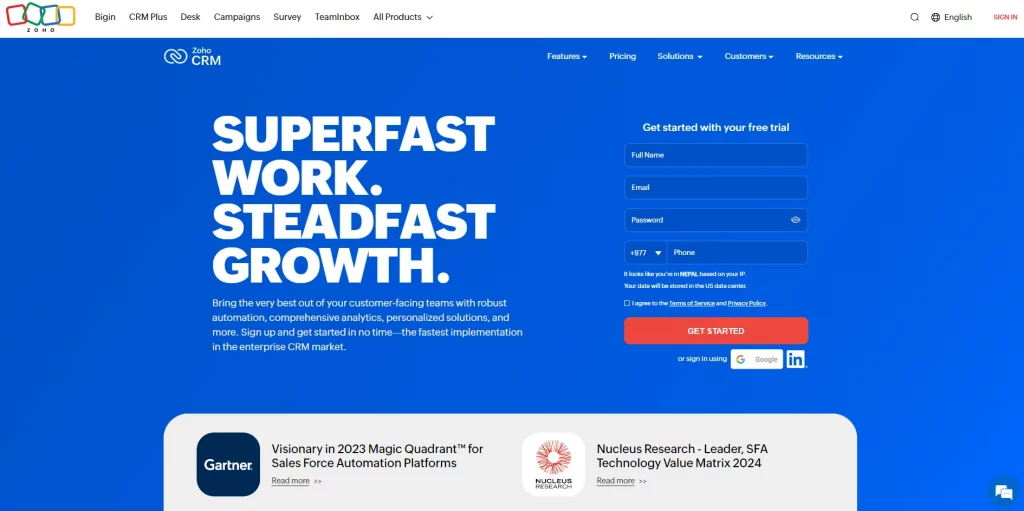
One of Zoho CRM’s notable strengths is its customization capabilities, allowing businesses to tailor the CRM to their needs without extensive coding knowledge. It integrates seamlessly with other Zoho applications, like Zoho Campaigns for email marketing and Zoho Desk for customer support, providing a unified platform for managing customer interactions across departments.
Features
- Lead and contact management
- Sales automation
- Workflow automation
- Analytics and Reporting
- Social media integration
Limitations
- The user interface can be cluttered
- Limited advanced features in lower-tier plans
- Customer support can be slow
Pricing
- Standrad: $20/user/month
- Professional: $35/user/month
- Enterprise: $50/user/month
- Ultimate: $65/user/month
4. Pipedrive
Pipedrive is a sales-focused customer relationship management (CRM) tool designed to simplify the sales process and improve productivity for teams of all sizes. It stands out for its intuitive interface and emphasis on visual pipeline management, allowing users to track deals through customizable stages easily.
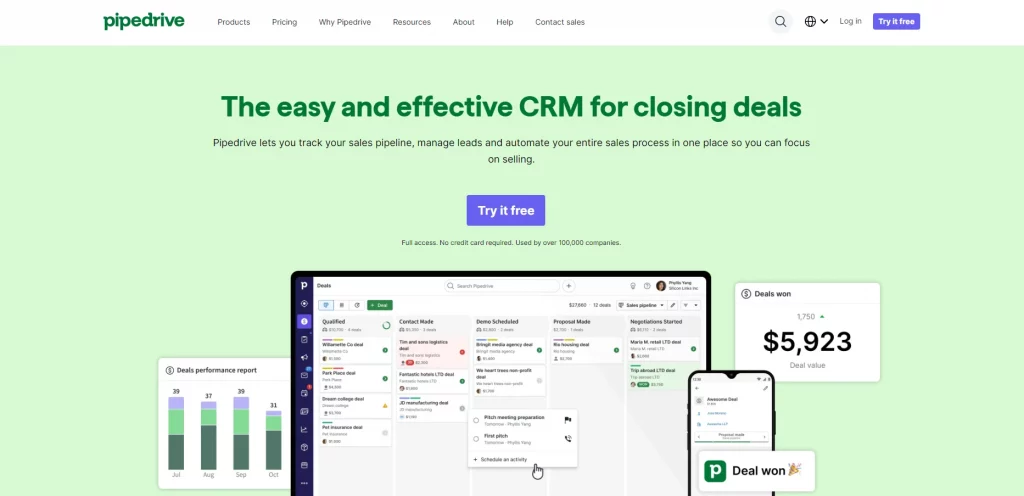
Key features of Pipedrive include contact management, sales pipeline visibility, email integration, and goal setting. It offers automation options to streamline repetitive tasks and prioritize activities based on deal status and potential value. Pipedrive also provides insightful reporting and analytics to track sales performance and identify areas for improvement.
Features
- Sales pipeline management
- Email integration
- Activity reminders
- Customizable pipelines
- Sales reporting
Limitations
- Limited marketing automation features
- Basic reporting features in lower-tier plans
- It can be expensive for small teams
Pricing
- Essential: $15/user/month
- Advanced: $29/user/month
- Professional: $59/user/month
- Enterprise: $99/user/month
5. Microsoft Dynamics 365
Microsoft Dynamics 365 is an intelligent business application suite that combines CRM and ERP capabilities. It integrates seamlessly with Microsoft’s ecosystem, including Azure, Office 365, and Power Platform, offering a unified experience across sales, customer service, operations, finance, marketing, and more.
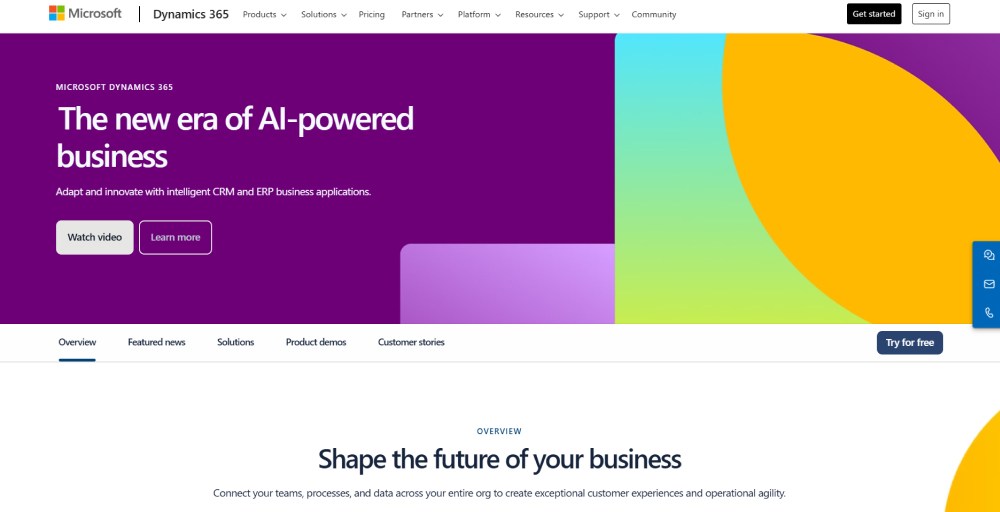
Microsoft Dynamics 365 CRM is designed to help organizations unify their customer-facing processes, gain deeper data-driven insights, and deliver better experiences across the entire customer lifecycle.
Features
- Sales and marketing automation
- Customer interaction management
- AI-driven insights
- Integration with Microsoft Office Suite
- Customizable dashboards
Limitations
- High cost
- Complex implementation
- Requires technical expertise for customization
Pricing
- Sales Professional: $65/user/month
- Sales Enterprise: $95/user/month
- Customer Service Professional: $50/user/month
- Customer Service Enterprise: $95/user/month
6. Freshsales
Freshsales is cloud-based customer relationship management (CRM) software for businesses of all sizes. It focuses on sales automation and lead management. It offers a user-friendly interface that allows teams to efficiently manage leads, track customer interactions, and prioritize tasks.
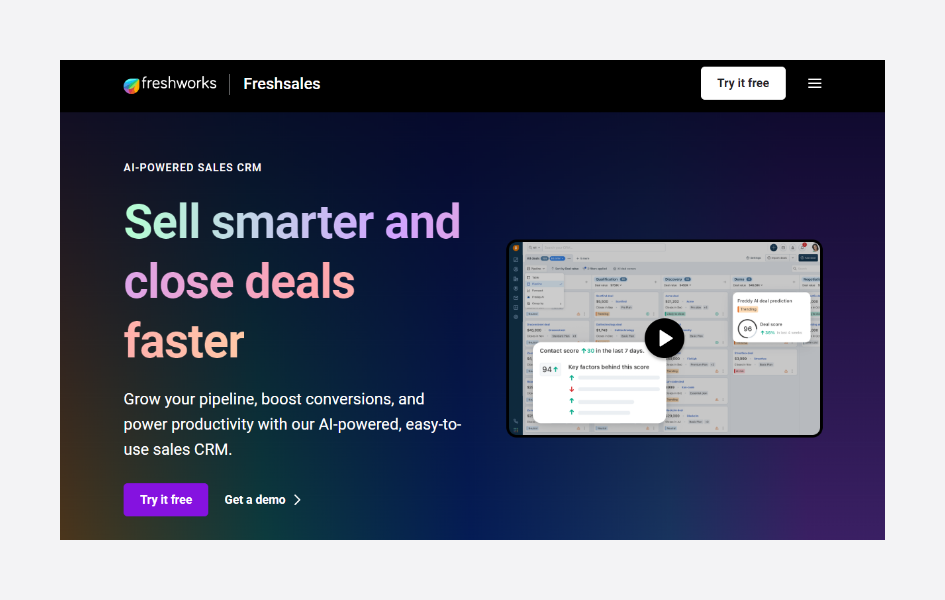
Freshsales emphasizes AI-powered capabilities such as sales automation, lead scoring, and sales forecasting, which help sales teams prioritize leads and make data-driven decisions. It also offers robust reporting and analytics tools to track sales performance and measure key metrics.
Features
- Lead management
- Sales automation
- Email tracking
- Built-in phone
- AI-based lead scoring
Limitations
- Limited integrations compared to competitors
- Advanced features are available only in higher-tier plans
- Customer support can be slow
Pricing
- Free plan available
- Growth: $15/user/month
- Pro: $39/user/month
- Enterprise: $69/user/month
7. ActiveCampaign
ActiveCampaign is a versatile CRM and email marketing automation platform designed to help businesses create personalized customer experiences. It integrates CRM functionality with powerful email marketing, marketing automation, and sales automation tools.
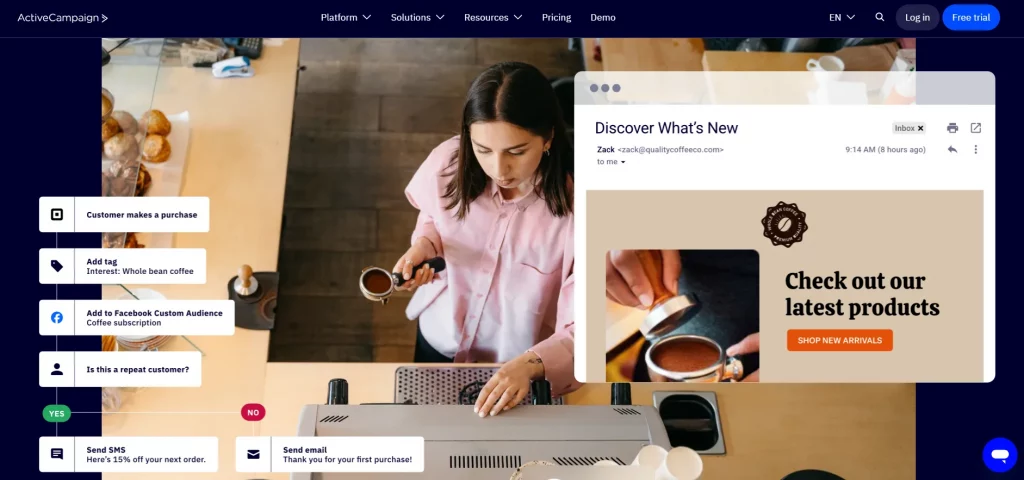
The platform’s CRM capabilities centralize customer data, track interactions across multiple channels, and effectively manage sales pipelines. It also offers advanced reporting and analytics tools to measure campaign performance, track ROI, and optimize marketing strategies.
Features
- Email marketing automation
- CRM and sales automation
- Lead scoring
- Landing pages and forms
- Integration with third-party apps
Limitations
- Steep learning curve
- It can become expensive as contacts and features increase
- Limited customization options in lower-tier plans
Pricing
- Lite: $9/month
- Plus: $49/month
- Professional: $149/month
- Enterprise: Custom pricing
8. Insightly
Insightly is cloud-based customer relationship management (CRM) software that integrates project management with CRM capabilities. It caters primarily to small and mid-sized businesses. It offers a unified platform for managing contacts, leads, organizations, projects, and tasks, providing a holistic view of customer interactions and project progress.
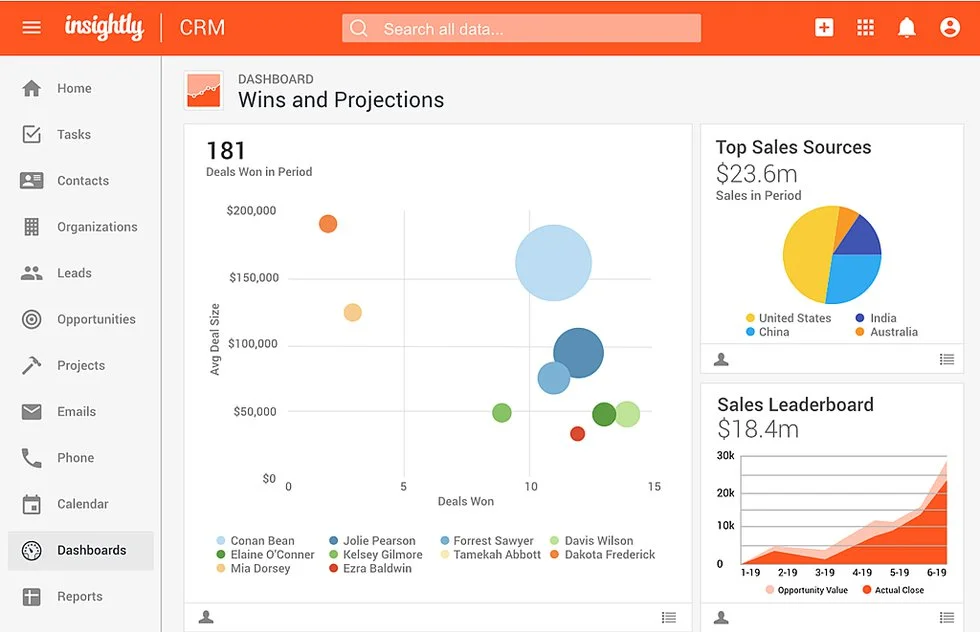
Insightly’s reporting and analytics tools offer insights into sales performance, project timelines, and customer engagement metrics, helping businesses make informed decisions and optimize their operations. It also supports integration with popular business tools such as G Suite, Office 365, Slack, and QuickBooks, enhancing its functionality and adaptability to different business environments.
Feature
- Project management
- Contact and lead management
- Workflow automation
- Email tracking
- Integration with third-party apps
Limitations
- Limited customization options
- It can be complex for new users
- Advanced features in higher-tier plans only
Pricing
- Plus: $29/user/month
- Professional: $49/user/month
- Enterprise: $99/user/month
9. SugarCRM
SugarCRM is an open-source customer relationship management (CRM) software known for its flexibility and extensive customization options. Through a centralized platform, it enables businesses to manage customer relationships across sales, marketing, and customer support departments.
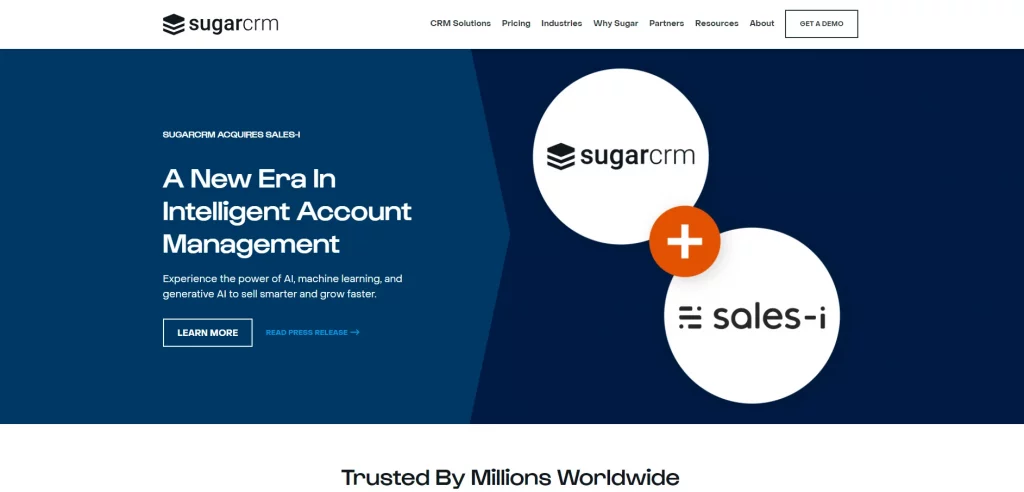
SugarCRM’s open-source nature allows businesses to tailor the CRM to their needs and integrate it seamlessly with other business applications. It offers robust reporting and analytics capabilities, providing insights into sales performance, campaign effectiveness, and customer behavior that can be used for behavioral segmentation.
Features
- Sales and marketing automation
- Customer service management
- Reporting and analytics
- Workflow automation
- Customizable dashboards
Limitations
- High cost for small businesses
- Complex implementation
- Requires technical expertise for customization
Pricing
- Sugar Professional: $52/user/month
- Sugar Enterprise: $85/user/month
- Sugar Sell: $80/user/month
10. Keap (Infusionsoft)
Keap, formerly known as Infusionsoft, is a CRM and marketing automation platform designed specifically for small businesses. It combines CRM functionality with tools for email marketing, sales automation, and e-commerce, aiming to simplify and automate various aspects of customer relationship management and business operations.
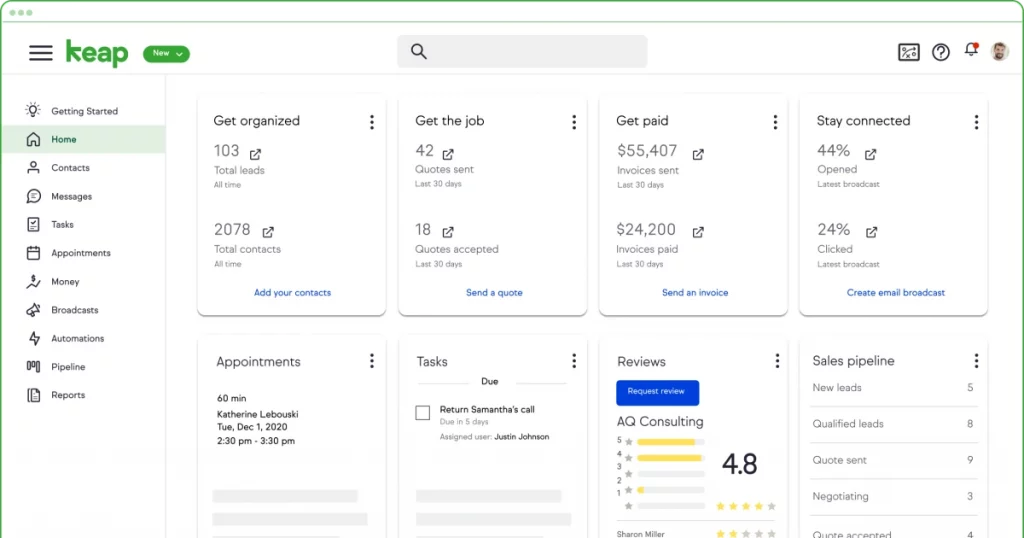
Keap’s e-commerce capabilities enable businesses to create online storefronts, manage inventory, and process payments seamlessly within the platform. It also provides robust reporting and analytics tools to track campaign performance, measure ROI, and optimize marketing strategies.
Features
- Email marketing
- CRM and sales automation
- Lead scoring
- Landing pages and forms
- Appointment scheduling
Limitations
- Steep learning curve
- Higher cost compared to other CRMs
- Limited customization in lower-tier plans
Pricing
- Lite: $79/month
- Pro: $169/month
- Max: $249/month
How to choose a marketing CRM?
Choosing the right marketing CRM for your business involves carefully considering several key factors to ensure it meets your needs and helps you achieve your goals effectively.
Here are some crucial elements to consider when selecting a marketing CRM:
1. Budget
The first step in selecting a marketing CRM is to determine your budget. CRM solutions come in a wide range of pricing plans, from free versions to premium packages that offer extensive features. It’s essential to evaluate the cost relative to its benefits and ensure it fits within your financial constraints without compromising on necessary functionalities.
2. Integration with Other Systems
A good marketing CRM should seamlessly integrate with your existing systems, such as email marketing tools, social media platforms, and e-commerce software. This integration ensures data flows smoothly across different platforms, providing a unified view of customer interactions and streamlining your marketing efforts.
3. Customer Support
Reliable customer support is critical when choosing a marketing CRM. You should look for vendors that offer comprehensive support, including live chat, phone support, and detailed documentation. If they have good customer support, they will ensure that all your issues or questions are promptly addressed, minimizing downtime and maintaining productivity.
4. Get Input From Your Team
Involving your team in decision-making is crucial. Gather feedback from the users who will be interacting with the CRM daily. Their insights on usability, feature requirements, and potential challenges can help you choose a solution that best fits their workflow and enhances overall efficiency.
5. List Your Required Features
Identify and list the specific features your business needs from a CRM. Whether it’s email marketing automation, lead scoring, analytics, or mobile access, clearly understanding your requirements will help you narrow your options and choose a CRM that aligns with your marketing objectives.
6. Scalability
Consider the future growth of your business when choosing a CRM. The selected CRM should be scalable, allowing you to add more users and features as your business expands. This ensures the CRM can grow with your business without needing a complete overhaul.
7. User-Friendly Interface
A user-friendly interface ensures your team can quickly adapt to the new system. A CRM with intuitive navigation and a straightforward design reduces the learning curve and enhances user adoption, leading to more effective tool use.
Conclusion
Choosing the right marketing CRM is a strategic decision that can significantly impact your business’s efficiency and customer engagement. That is because a well-chosen CRM streamlines your marketing efforts, enhances customer relationships, and drives overall business success.
You can select a CRM that aligns with your marketing goals and supports your business’s growth by considering budget, integration with existing systems, customer support, team input, required features, scalability, and user-friendly interface.
FAQ
1. Are marketing CRMs expensive?
Marketing CRMs come in various price ranges, from free or low-cost options suitable for small businesses to more expensive solutions designed for large enterprises. The cost typically depends on the features and scalability offered by the CRM.
2. What is the best CRM for my small business?
Popular options for small businesses include HubSpot, Zoho CRM, and Freshsales, which offer affordable pricing and essential features to help manage customer relationships effectively.
3. How does CRM help marketing goals?
CRM systems help achieve marketing goals by automating marketing tasks, providing detailed customer insights, enabling personalized communication, and improving customer service. This leads to more targeted marketing campaigns, higher customer satisfaction, and better overall marketing performance.
4. How much does CRM marketing software cost?
CRM marketing software can cost as low as $12 per user per month and up to several hundred dollars per user per month for advanced features and larger teams.
5. What are some essential features when choosing CRM marketing software?
Important features include email marketing automation, lead management, analytics and reporting, integration with other tools, mobile access, and customer support. Additionally, ensure the CRM is scalable and user-friendly to accommodate your team’s future growth and ease of use.
6. Is CRM marketing software challenging to use?
The ease of use of CRM marketing software varies by platform. Many modern CRMs are designed with user-friendly interfaces and provide extensive training resources and customer support to help users get up to speed quickly. Choosing a CRM that fits your team’s technical capabilities and offers adequate support is important.

